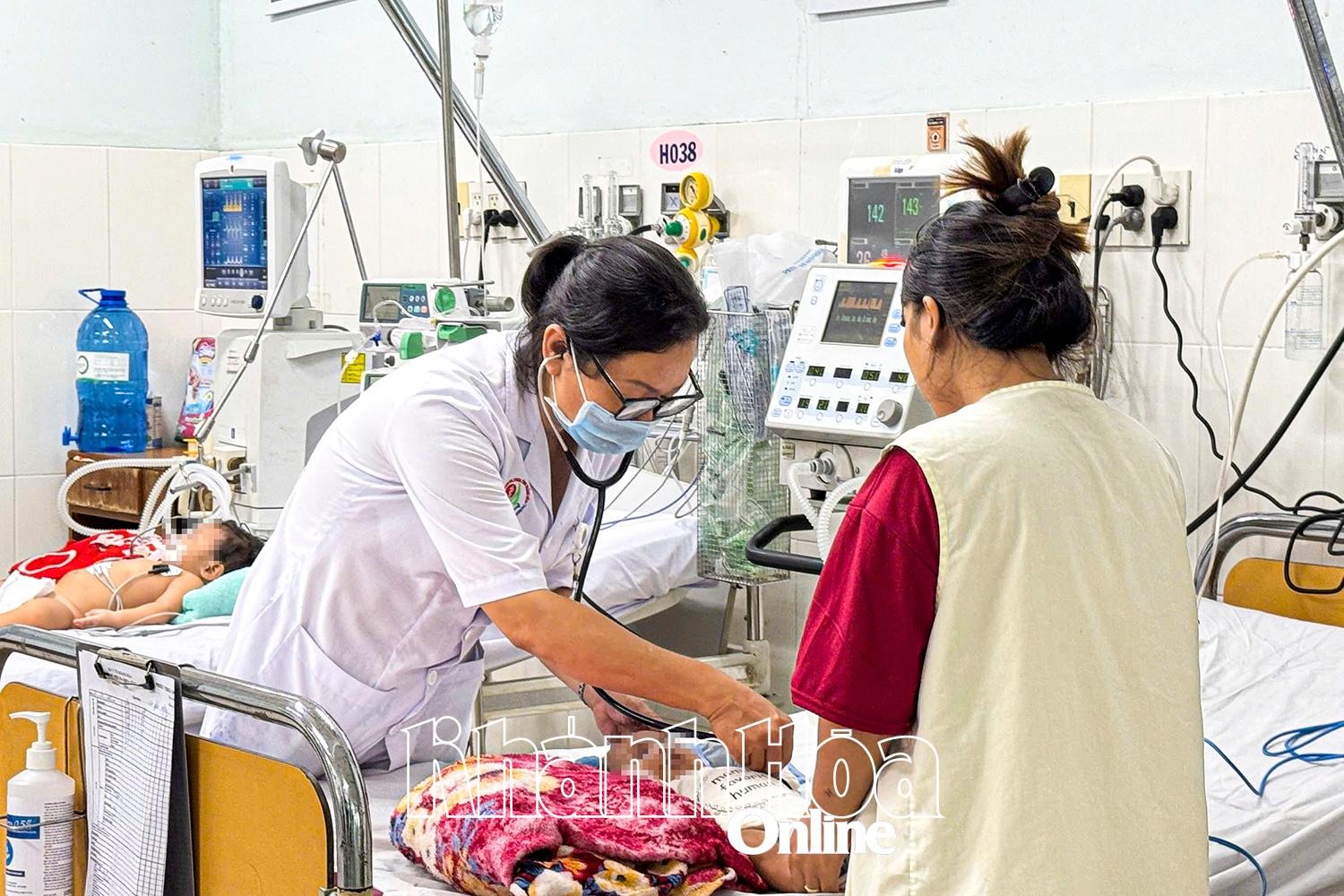Hospital overcrowding
At the Pediatrics Department of Khanh Hoa General Hospital, the number of children seeking treatment for respiratory illnesses has surged dramatically over the past week, with all beds occupied. In previous months, the department received an average of 30-40 new cases per day; now, the number has risen to 70-80, a 2.5-fold increase. On average, the department treats approximately 300 children daily, with more than half suffering from respiratory illnesses. With only 50 beds dedicated to respiratory conditions, the daily treatment volume exceeds 150 children, leading to overcrowding. Many children have to share beds, sometimes two, three, or even four children per bed.
 |
| Doctors are checking the health of a child with severe pneumonia in the Pediatric Intensive Care Unit. |
At the Pediatrics Department, Ms. Tran Thi Kim Diem (Ninh Hoa ward ) said that her 2.5-year-old child had a fever and cough, so she brought him to the hospital. The doctor diagnosed him with a relatively severe respiratory illness and is currently ordering a chest X-ray to determine the exact condition. Ms. Kim Diem shared: “At home, the family took good care of him, keeping him warm, but due to the constantly changing weather, he got sick.” In another room, Ms. Vo Ngo My Hanh (Tay Nha Trang ward) struggled to find a suitable place to breastfeed her child because two children were sharing a hospital bed. Ms. My Hanh recounted: “My child had an unusually high cough and fever, so the family brought him to the hospital. Here, the doctor diagnosed him with relatively severe pneumonia. Before that, the whole family had colds and fevers, so it's possible that he was infected.”
Many severe cases
Not only is the number of cases increasing rapidly, but what is worrying is that 80% of hospitalized children are under 3 years old, a group with weak resistance and underdeveloped immune systems, making them very vulnerable to erratic weather changes. In addition, many children are brought to the hospital when their condition has already worsened, with severe pneumonia or bronchitis.
In the pediatric intensive care unit, due to their critical condition, four babies under one year old requiring ventilator support were admitted. Baby T. (5 months old, from Khanh Son commune) was placed in special care. She was admitted with severe pneumonia and sepsis, requiring ventilator support. Baby T.'s mother said that her child had a fever and cough at home for nearly a week, and the family bought medicine for her, thinking it was just a common cold. Only when her condition worsened, with frequent coughing and difficulty breathing, did the family take her to the hospital. Upon admission, she was in severe respiratory failure, with chest retraction and cyanosis. In the adjacent bed, baby K. (1 month old) had been weaned off the ventilator for three days and her health was now stable. Prior to admission, she had severe pneumonia, cyanosis, labored breathing, and chest retraction.
Respiratory illnesses in children often increase sharply during transitional seasons – when humidity and temperature fluctuate constantly, creating favorable conditions for viruses and bacteria to thrive. However, many parents are still complacent, self-medicating with fever reducers and antibiotics, or delaying taking their children to the doctor, causing the illness to worsen quickly and leading to dangerous complications. With the high volume of patients and many severe cases, the Pediatrics Department of Khanh Hoa General Hospital has had to implement many solutions to reduce the workload and minimize cross-infection. Dr. Vo Minh Hien from the Pediatrics Department stated: “The department will place children with mild illnesses or those whose condition is stable into the day care program combined with outpatient treatment. Accordingly, after examination and medication, parents can take their children home for care and return to the hospital the following day for a follow-up check. Parents should note that children, especially those under 2 years old (this age group accounts for nearly 80% of hospital admissions), are prone to developing pneumonia after contracting the flu. Recently, many students have been hospitalized with pneumonia after contracting the flu. Therefore, during this transitional season, parents need to ensure their children receive adequate nutrition; prevent contact with sick family members; and ensure their children receive all necessary vaccinations, including the seasonal flu vaccine, which should be administered before September to help build antibodies.”
Khanh Hoa is entering a transitional period between seasons, with unpredictable weather changes, alternating rain and sunshine, which is also the "peak season" for respiratory illnesses in young children. Therefore, along with the proactive efforts of the health sector in prevention, control, and treatment, raising awareness of disease prevention in the community is also a crucial factor in effectively controlling the increase in diseases and protecting children's health. In particular, educational institutions, especially preschools and primary schools, need to strengthen measures to prevent respiratory illnesses in children, maintain well-ventilated classroom environments, sanitize learning materials, and limit children's contact with sick individuals.
THAO LY
Source: https://baokhanhhoa.vn/xa-hoi/y-te-suc-khoe/202510/tre-mac-benh-ho-hap-tang-cao-be50cdb/
































![[Photo] General Secretary To Lam receives the Special Envoy of General Secretary and President of China Xi Jinping](/_next/image?url=https%3A%2F%2Fvphoto.vietnam.vn%2Fthumb%2F1200x675%2Fvietnam%2Fresource%2FIMAGE%2F2026%2F01%2F30%2F1769759383835_a1-bnd-5347-7855-jpg.webp&w=3840&q=75)





























































![OCOP during Tet season: [Part 3] Ultra-thin rice paper takes off.](/_next/image?url=https%3A%2F%2Fvphoto.vietnam.vn%2Fthumb%2F402x226%2Fvietnam%2Fresource%2FIMAGE%2F2026%2F01%2F28%2F1769562783429_004-194121_651-081010.jpeg&w=3840&q=75)

![OCOP during Tet season: [Part 2] Hoa Thanh incense village glows red.](/_next/image?url=https%3A%2F%2Fvphoto.vietnam.vn%2Fthumb%2F402x226%2Fvietnam%2Fresource%2FIMAGE%2F2026%2F01%2F27%2F1769480573807_505139049_683408031333867_2820052735775418136_n-180643_808-092229.jpeg&w=3840&q=75)





Comment (0)